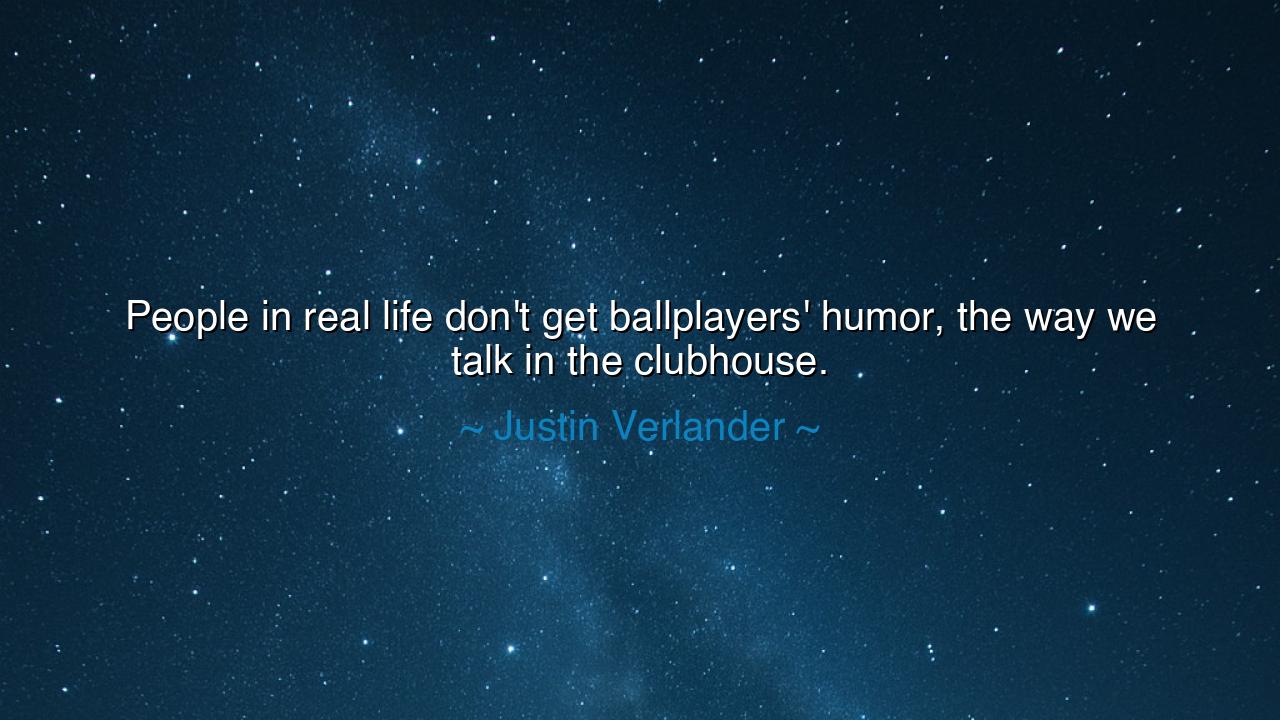
People in real life don't get ballplayers' humor, the way we talk






In the great theater of life, where the masses watch with awe and wonder, there are those who dwell behind the curtain, in the sacred halls where the real drama unfolds. It is in these hidden chambers, where the tribes of warriors gather, that the truest language of their souls is spoken. There, in the clubhouse, where brotherhood is forged in sweat and sacrifice, the humor is not for the outside world—it is a language that can only be understood by those who share the same battles, the same tribulations. And so, when Justin Verlander, the great pitcher, says, "People in real life don't get ballplayers' humor, the way we talk in the clubhouse," he speaks a truth that echoes through the corridors of time: the humor of the tribe is an internal language, one that is born of shared experience and can never be fully understood by the outsider.
Consider the ancient warriors of old, those who fought side by side in the heat of battle. Their bonds, forged in the fires of conflict, gave rise to a special kind of camaraderie, a humor born not from idle jest, but from the shared understanding of what it meant to risk one's life for a common cause. They did not need to explain their jokes, for their laughter was the sound of unity in the face of adversity. The humor they shared was not for the masses; it was a sacred language, one that only those who had fought together could comprehend. It was a language of trust, a balm for the wounds of battle, a reminder that even in the midst of strife, joy could still be found.
In the world of athletes, this truth is no less significant. Ballplayers—those who live their lives in the arena of sport—know a bond like few others. They are not simply teammates; they are brothers, united by a common purpose. Their humor, often seen as unfathomable or irreverent by those outside the circle, is not born of malice, but of a shared journey. The long hours of practice, the crushing defeats, the exhilarating victories—these experiences bind them together in a way that no outsider can truly understand. And so, the humor they share is an expression of this deep connection—a way to laugh in the face of pressure, a way to keep their spirits high in the midst of the grind.
The story of the gladiators of ancient Rome offers a poignant parallel. These warriors, like modern athletes, fought not just for their own glory, but for the honor of their comrades. The bonds they shared were often sealed in the sands of the arena, where life and death hung in the balance. Their humor, too, was their own—a form of expression that could not be comprehended by the masses who watched them from afar. It was a humor that allowed them to face the horrors of battle with dignity and strength, a humor that reflected their camaraderie and the shared understanding of the brutal world they inhabited.
The humor of ballplayers, much like that of ancient warriors, serves as a shield against the intensity of their lives. The pressure to perform, the expectations of the crowd, the scrutiny of the media—these external forces are constant, unyielding. But within the walls of the clubhouse, there is a sanctuary where the true spirit of the game can flourish. Here, in the safe haven of shared humor, the ballplayers are free to be themselves. They can laugh at the absurdities of the game, at their own mistakes, and at the strange world they inhabit. This humor is their armor, their means of coping with the demands of a life that is so often lived under a microscope.
In his words, Verlander reminds us of this truth: that the humor we share with those who walk with us on the same path is sacred. It is not meant to be dissected by those who do not understand the journey. It is a bond that speaks to the heart of our humanity, a reminder that even in the most intense of circumstances, we can find lightness. And it is in this lightness that we are able to endure, to press on through the hardest trials.
And so, dear reader, the lesson is clear: in life, there will be times when we find ourselves facing tribulations that the world may not understand. But within our own circles, whether they are work, family, or friends, we must cherish the humor that binds us. This humor is a gift, a reminder that even in the most serious of endeavors, we can find joy. Let us not be afraid to laugh, to share those moments of lightness with those who walk beside us. For in these moments, we find strength, unity, and a deeper understanding of one another—a bond that cannot be broken, no matter how intense the journey may become.






AAdministratorAdministrator
Welcome, honored guests. Please leave a comment, we will respond soon